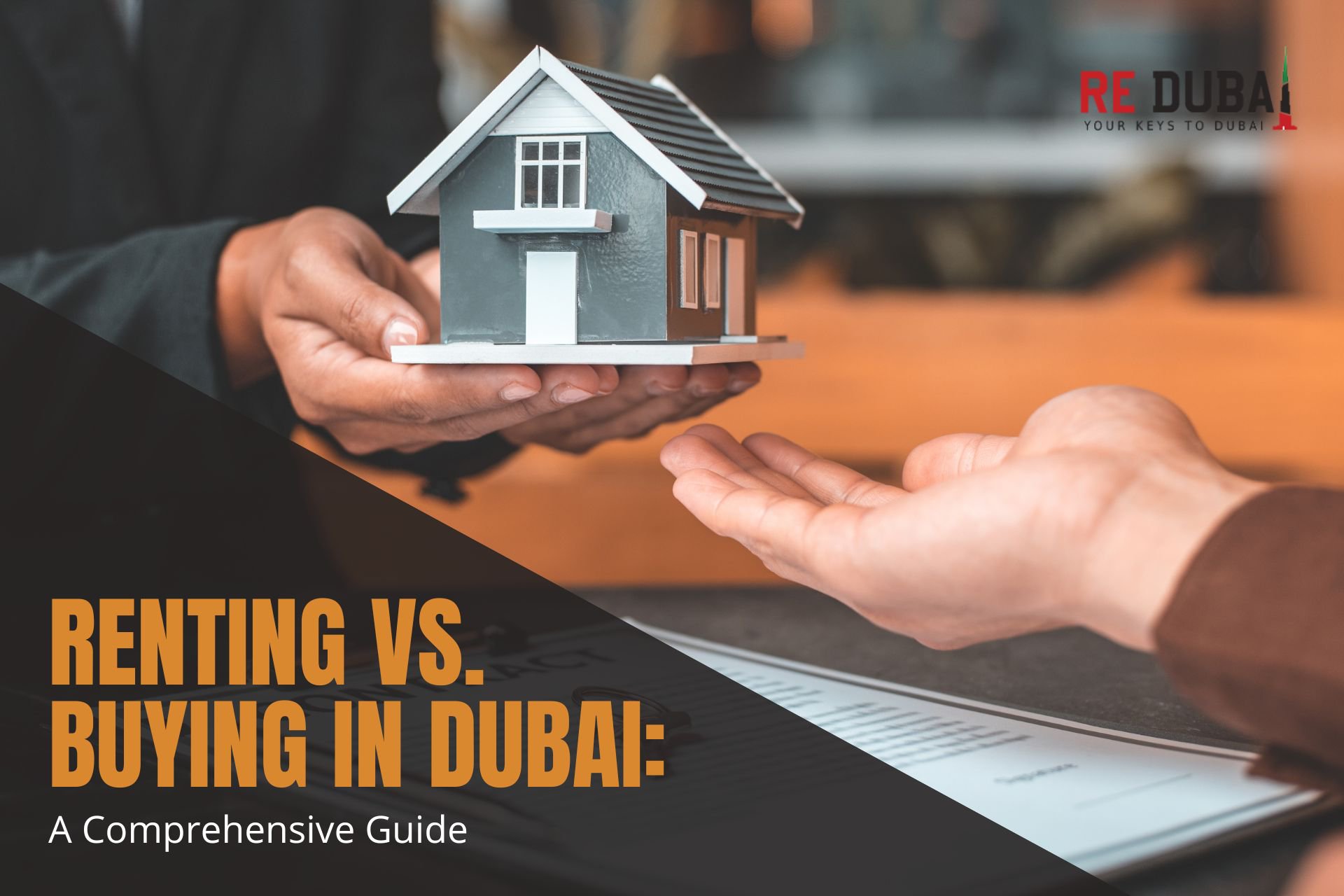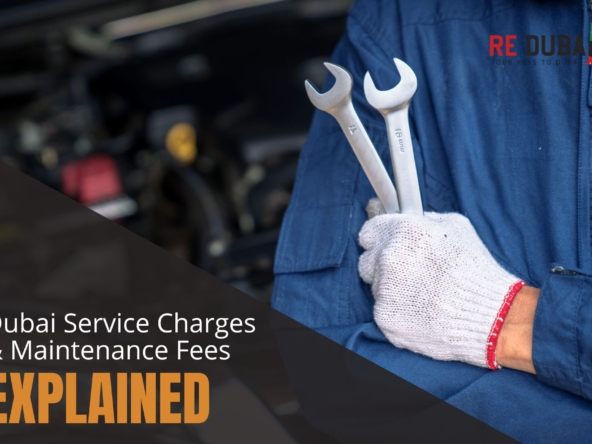Renting versus buying property in Dubai is a significant decision that requires careful consideration of various factors. With a dynamic real estate market offering diverse options, from luxurious villas to modern flats, making an informed choice based on individual circumstances is crucial. This guide provides a comprehensive Dubai property renting vs. buying comparison to help you decide whether renting or buying property in Dubai is the best option for you.

Pros and Cons of Renting
Advantages of Renting
- Flexibility and Mobility: Renting offers greater flexibility, making it ideal for those with transient lifestyles or short-term work assignments. Lease terms can be tailored to suit your needs, allowing easy relocation within Dubai or abroad.
- Lower Initial Costs: Renting generally requires lower upfront costs compared to buying. Typically, tenants need to pay a security deposit and monthly rent, avoiding the substantial down payment and additional fees associated with purchasing property.
- Maintenance and Repairs: In rented properties, landlords or property management companies usually handle maintenance and repair responsibilities, relieving tenants of unexpected repair costs and the hassle of finding service providers.
- Access to Amenities: Many rental properties in Dubai are part of residential communities that offer amenities like swimming pools, gyms, and parks, enhancing the living experience without extra costs.
- Location Options: Renting allows you to explore various neighborhoods in Dubai, helping you find the area that best suits your lifestyle and preferences without long-term commitment.
Disadvantages of Renting
- Lack of Equity Building: Rent payments do not contribute to building equity, meaning tenants do not benefit from property appreciation.
- Potential Rent Increases: Rent prices can increase periodically, impacting long-term financial planning.
- Limited Control: Tenants may face restrictions on modifications and personalization of the property, limiting the ability to make it feel like home.
Pros and Cons of Buying
Advantages of Buying
- Long-Term Investment: Purchasing property in Dubai can be a sound long-term investment. Property values in Dubai have shown historical appreciation, potentially offering significant returns over time.
- Stability and Security: Homeownership provides stability and security. Owners have control over their property and are not subject to rental price volatility or eviction risks.
- Customization and Personalization: Owning a property allows you to customize and personalize your living space according to your preferences, from interior design to major renovations.
- Potential Rental Income: Property owners can generate rental income by leasing out their property, especially in high-demand areas, providing a steady income stream.
- Appreciation of Property Value: With Dubai's real estate market growth, property values tend to appreciate, offering potential capital gains if you decide to sell in the future.
Disadvantages of Buying
- High Initial Costs: Buying property involves significant upfront costs, including a substantial down payment, transaction fees, and ongoing maintenance expenses.
- Market Volatility: Real estate markets can be volatile. Economic downturns can lead to property depreciation, affecting the investment value.
- Maintenance Responsibility: Property owners are responsible for all maintenance and repairs, which can be costly and time-consuming.
Financial Considerations
Renting
- Monthly Expenses: Rent payments typically include the rent amount and utilities.
- Upfront Costs: Security deposit (usually one to two months' rent), agency fees, and first month’s rent.
- Maintenance Costs: Generally covered by the landlord.
Buying
- Monthly Expenses: Mortgage payments, utilities, property insurance, and maintenance costs.
- Upfront Costs: Down payment (usually 20-25% of the property value), property registration fees, agent commission, and other closing costs.
- Maintenance Costs: Full responsibility lies with the owner.

Market Analysis
Current Market Conditions
Dubai's real estate market is characterized by dynamic changes influenced by economic factors and global events. As of 2024, the market shows a steady demand for both rental and purchase properties, with trends indicating a slight increase in rental rates and property prices due to growing population and investor confidence.
Trends
- Rental Rates: Have shown a modest increase, particularly in high-demand areas.
- Property Prices: Gradually appreciating, with luxury properties and prime locations seeing significant value growth.
- Supply-Demand Dynamics: Balanced market with a good mix of new developments and resale properties.
Lifestyle and Future Plans
Factors to Consider
- Career Stability: Assess your job security and long-term career plans in Dubai. Stable employment may support a decision to buy, while uncertain job prospects may favor renting.
- Family Size: Consider your current and future family needs. Larger families might prefer the stability and customization options of owning a home.
- Long-Term Residency Plans: If you plan to stay in Dubai for an extended period, buying may be more advantageous. For short-term or uncertain plans, renting offers more flexibility.
Risk Assessment
Renting Risks
- Market Volatility: Potential for rent increases and limited control over lease renewals.
- No Equity Building: Monthly rent payments do not contribute to asset ownership.
Buying Risks
- Property Depreciation: Economic downturns can reduce property values.
- Financial Commitment: Long-term financial obligation with high initial costs and ongoing expenses.
Decision-Making Framework
Key Considerations
- Financial Health: Assess your budget, savings, and ability to secure a mortgage.
- Duration of Stay: Evaluate how long you plan to live in Dubai.
- Market Research: Stay informed about current market conditions and trends.
- Lifestyle Needs: Consider your lifestyle preferences and future family plans.
Questions to Ask
- Can I afford the down payment and ongoing costs of homeownership?
- How long do I plan to stay in Dubai?
- What are my career and family plans?
- What are the current market conditions?
Rent vs. Buy Calculator
A rent vs. buy calculator can help you make a data-driven decision by comparing the costs of renting and buying over a specified period.
How to Use
- Input Data: Enter details such as rent amount, property price, down payment, mortgage interest rate, and length of stay.
- Calculate: The calculator will provide a comparison of total costs for renting versus buying.
- Interpret Results: Analyze the results to understand the financial implications of each option.
Conclusion
Deciding whether to rent or buy property in Dubai involves evaluating various factors, including financial situation, long-term plans, lifestyle preferences, and market conditions. Renting vs. buying property in Dubai offers flexibility and lower initial costs, while buying provides long-term investment potential and stability. By carefully assessing these considerations and utilizing tools like a rent vs. buy calculator, you can make an informed decision that aligns with your personal and financial goals. If needed, seek professional advice to ensure the best outcome for your circumstances.
For more detailed insights and personalized assistance, visit Redubai. Our expert team is dedicated to helping you navigate the Dubai real estate market, ensuring you make the right decision for your unique needs and circumstances.




